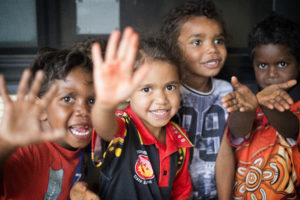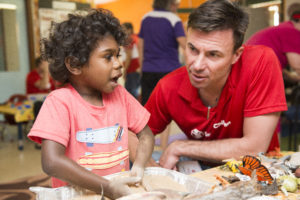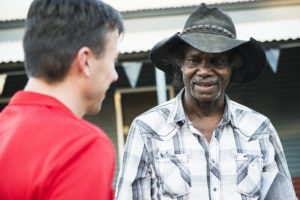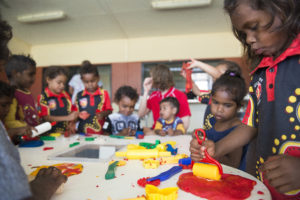Save the Children is well known for its work in conflict zones, in addressing entrenched poverty and natural disaster emergencies around the world.
As one of the world’s largest charities, we operate in 120 countries, with more than 25,000 staff members. Last year we responded to more than 120 disasters in 61 countries.
But what is less widely known is that we are supporting families and communities in almost every state and territory of Australia. As of 2018, about half of our work occurs right here in Australia, in about 200 urban, regional and remote locations across this broad country—from big cities such as Sydney, to small country towns like Broken Hill. 
Photo Credit: Save The Children
Central to that work has been our commitment to work with Australia’s Indigenous population—Aboriginal and Torres Strait Islander people—to ensure all children in Australia get the best start in life. This aim aligns with the intent of the Sustainable Development Goals (SDG) to leave no one behind, and yet concerningly Australia is continuing to fail Indigenous people.
The colonisation of Australia, starting in 1788, had a devastating impact on the world’s most ancient living culture—the Aboriginal and Torres Strait Islander people.
Following colonisation, there was a dramatic impact on the local Aboriginal population due to introduced diseases and violence in the frontier conflicts.
In 2018, Australian Aboriginal and Torres Strait Islanders, and particularly their children, are still suffering the profound effects of white colonisation in Australia.
The school attendance rate of Indigenous children, 83.2 per cent, compared with 93.0 per cent for non-Indigenous students, has remained largely static since 2014.
For example, despite the laudable SDG goal to end poverty, Aboriginal and Torres Strait Islander people remain particularly likely to experience poverty, deprivation and social exclusion. Statistics on education, another key goal, are also concerning, particularly given education completion is one of the key ways to break the cycle of disadvantage. The school attendance rate of Indigenous children, 83.2 per cent, compared with 93.0 per cent for non-Indigenous students, has remained largely static since 2014.
Aboriginal and Torres Strait Islander children are also 10 times more likely to be living in out-of-home care and are two and a half times more likely to be held back in their development than non-Indigenous children. This experience is worsened by a cycle of outside intervention, including financial management, child removal and imprisonment. These interventions are part of systems not designed to support the specific cultural needs of our nation’s Aboriginal and Torres Strait Islander Peoples.
So what needs to change if we are to make progress?
Photo Credit: Save The Children
Addressing cultural difference requires creating opportunities for meaningful community participation for Aboriginal and Torres Strait Islander people in Australian life, such as education, employment and economic development. This approach must be designed and led by communities and be informed by respectful, yet robust, discussion.
Addressing complex disadvantage, in particular, requires services to be joined-up and better coordinated. Programs must address the social and economic issues together. We need to ensure that funding for community programs is maintained long enough for real change to occur.
For organisations like Save the Children working in Aboriginal and Torres Strait Islander communities, we must ensure that our engagement empowers these communities to be the active agents of the social and economic change they are seeking. This means we work along-side existing community leaders, we employ staff from within the community wherever possible and help build their skill and capability. In this way, when our work in that community is done, we leave behind a lasting legacy.
Related Articles:
![]() “CHAMPIONING THE FUTURE: THE CITY OF SYDNEY”
“CHAMPIONING THE FUTURE: THE CITY OF SYDNEY”
![]() “INDIGENOUS PEOPLES AND THEIR RIGHTS: HOW THEY STARTED, WHY THEY MATTER”
“INDIGENOUS PEOPLES AND THEIR RIGHTS: HOW THEY STARTED, WHY THEY MATTER”
![]() “THE RISE OF SYDNEY STARTUP ECOSYSTEM”
“THE RISE OF SYDNEY STARTUP ECOSYSTEM”
Save the Children’s commitment to empowering the local community is one of the reasons why about 26 per cent of our 600 employees now identify as being of Aboriginal or Torres Strait Islander heritage. They also bring crucial cultural and community knowledge to our programs. They use local approaches to creating safe environments for children to thrive, including engaging with community Elders that give our programs guidance and an opportunity for us, as outsiders, to learn about our Country.
The proportion of our staff who identify as Aboriginal and Torres Strait Islander increases the more remote the location. In some areas, more than 90 per cent of our local staff are Aboriginal.
But we are the first to admit we have a long way to go.
Photo Credit: Save The Children
Save the Children must do better to reach its goal of at least 35 per cent Aboriginal and Torres Strait Islander employment by mid next year. It is an important target of our mission to create lasting change for children in Australia.
We also know we must continue to respectfully exit when communities are ready to take on our programs and ensure we build this strategy into our work from day one. This only occurs through mutually respectful partnerships with the community and a process of two-way learning.
Sustainable exit planning and building readiness for transition to community control are embedded in our approach to service provision.
For example, earlier this year, we transitioned our playgroup in regional New South Wales to Maari Ma Health, the local Aboriginal primary healthcare provider. They took on the service and existing Save the Children staff in a staged transition to community control.
Around the same time, one of our family violence refuges on the Dampier Peninsula, Western Australia, was transitioned to management under Djarindjin Aboriginal Corporation after several years of management by Save the Children. 
Photo Credit: Save The Children
We know that to achieve real outcomes, we need to work with families and the community, employ local people with local knowledge and partner with local organisations. As an organisation, Save the Children must continue to improve the way it embeds Aboriginal and Torres Strait Islander governance structures into its core business, ensuring we listen to the advice of the leaders in the communities we work in.
This will ensure the next chapter of our work with Aboriginal and Torres Strait communities is informed by partnership, collaboration and respect, and is sustainable, for many generations to come.
Not-for-profit organisations are responsible for translating high level goals, such as the Sustainable Development Goals, into practical and meaningful solutions for communities affected by inequality.
And nowhere in Australia are there people more affected by entrenched inequality than Aboriginal and Torres Strait Islander Peoples.
We are not the whole solution but are proud to play our part in supporting Aboriginal and Torres Strait Islander communities to be self-empowered and build better futures.












